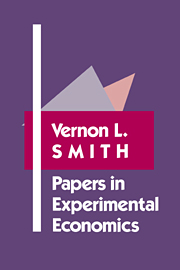Book contents
- Frontmatter
- Contents
- Preface
- Acknowledgments
- Part I The Formative Years
- Part II Institutions and Market Performance
- Introduction
- 10 On Nonbinding Price Controls in a Competitive Market
- 11 An Experimental Comparison of Alternative Rules for Competitive Market Exchange
- 12 Competitive Market Institutions: Double Auctions vs. Sealed Bid-Offer Auctions
- 13 Markets as Economizers of Information: Experimental Examination of the “Hayek Hypothesis”
- 14 The Effect of Rent Asymmetries in Experimental Auction Markets
- 15 Microeconomic Systems as an Experimental Science
- 16 Experimental Economics (Reply to R. Heiner)
- 17 A Comparison of Posted-Offer and Double-Auction Pricing Institutions
- 18 Hypothetical Valuations and Preference Reversals in the Context of Asset Trading
- 19 Bubbles, Crashes, and Endogenous Expectations in Experimental Spot Asset Markets
- Part III Public Goods
- Part IV Auctions and Institutional Design
- PART V Industrial Organization
- Part VI Perspectives on Economics
13 - Markets as Economizers of Information: Experimental Examination of the “Hayek Hypothesis”
Published online by Cambridge University Press: 06 July 2010
- Frontmatter
- Contents
- Preface
- Acknowledgments
- Part I The Formative Years
- Part II Institutions and Market Performance
- Introduction
- 10 On Nonbinding Price Controls in a Competitive Market
- 11 An Experimental Comparison of Alternative Rules for Competitive Market Exchange
- 12 Competitive Market Institutions: Double Auctions vs. Sealed Bid-Offer Auctions
- 13 Markets as Economizers of Information: Experimental Examination of the “Hayek Hypothesis”
- 14 The Effect of Rent Asymmetries in Experimental Auction Markets
- 15 Microeconomic Systems as an Experimental Science
- 16 Experimental Economics (Reply to R. Heiner)
- 17 A Comparison of Posted-Offer and Double-Auction Pricing Institutions
- 18 Hypothetical Valuations and Preference Reversals in the Context of Asset Trading
- 19 Bubbles, Crashes, and Endogenous Expectations in Experimental Spot Asset Markets
- Part III Public Goods
- Part IV Auctions and Institutional Design
- PART V Industrial Organization
- Part VI Perspectives on Economics
Summary
INTRODUCTION
Economics has tended to be long on theories (Hypotheses) and the use of “logical completeness” as a criterion for judging the value of a theory, but short on technologies for discriminating among theories on the basis of rigorous standards of empirical evidence. Consequently, the body of theory in economics tends to grow from a steady stream of additions, with replacements occurring only occasionally. It is sometimes claimed that our methodology is limited by the fact that economics is complicated and we cannot do experiments, with the result that logical completeness becomes a crucially important test criteria. Caricaturized, it is as if economics had tried to do the work of classical physics by a shortcut that bypassed Galileo and Kepler and started “at the top” with the intellectually more interesting methods of Isaac Newton. The consequences of this confusion of form with substance would be of less import were it not for the fact that as “experts” we have made, or fellow-traveled with, policy prescriptions requiring us to know more than indeed we can demonstrate that we know. This professional process seems to have led us to believe that our Keynesian prescriptions could fine-tune the economy, that regulation would solve the alleged monopoly problem, and that coercive action was implied ipso facto by the untested theorem that market institutions will “fail” in the presence of externality and public goods.
- Type
- Chapter
- Information
- Papers in Experimental Economics , pp. 221 - 235Publisher: Cambridge University PressPrint publication year: 1991



